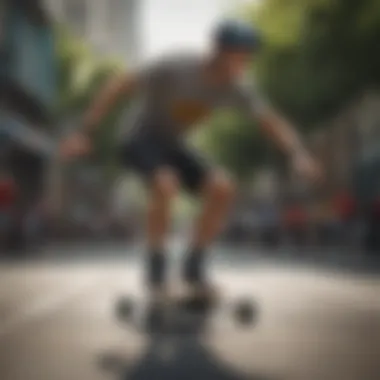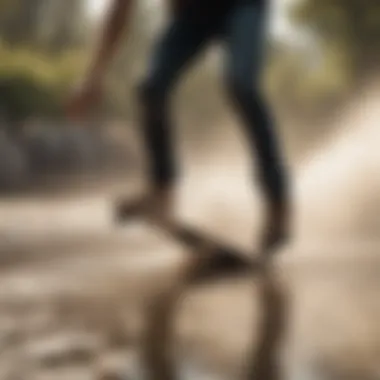Mastering Longboard Sliding Techniques for Enhanced Riding Skills


Equipment and Gear
When choosing equipment, longboarders should consider top brands like Triple 8, Pro-Tec, and TSG for helmets, and Sector 9, Loaded Boards, and Rayne Longboards for longboards. These brands offer a range of products specifically designed for sliding and freeride longboarding, ensuring stability and control while executing slides.
Maintenance of longboard gear is critical to prolong its lifespan and maintain optimal performance. Longboarders should regularly inspect their equipment for wear and tear, including checking trucks, wheels, and bearings for any signs of damage. Upgrading components such as wheels and bushings can significantly impact slide control and speed. Stay updated on the latest advancements in longboard gear, such as new materials and technologies, to enhance your sliding experience.
Longboarding is not merely about cruising; it's a complex dance between rider and board. This guide will dissect the intricate art of sliding on a longboard, exploring every nuance from body dynamics to terrain adaptability. By delving into the depths of mastering slide techniques, you will unlock a realm of fluidity and control previously uncharted. Strap in, align your focus, and let's embark on this exhilarating journey.
Understanding the Basics of Longboard Sliding
Importance of Sliding in Longboarding
Sliding in longboarding is not just a flashy move; it's a fundamental skill that amplifies control and opens doors to advanced maneuvers. The ability to slide empowers riders to navigate corners with finesse, regulate speed effortlessly, and enhance overall riding experience. Whether you seek thrills on steep descents or precision in crowded urban settings, mastering sliding is key to conquering the longboard realm. Embracing this aspect will elevate your skills and push your boundaries further than ever before.
Essential Equipment for Sliding
Equipping yourself with the right gear is paramount for a safe and enjoyable sliding experience. Slide gloves, knee and elbow pads, and a sturdy helmet are not optional but necessary companions on your sliding journey. These accessories are not mere add-ons; they are vital protective layers that shield you from potential harm and allow you to slide with confidence and peace of mind. Investing in high-quality gear ensures that your sliding sessions are not only thrilling but also safe and sustainable.
Choosing the Right Longboard for Sliding
When it comes to longboarding, the board is not just a tool; it's an extension of your riding style. Selecting the right longboard for sliding entails considering factors like deck length, flexibility, and wheelbase. A longer deck offers stability for high-speed slides, while a flexible board enhances maneuverability for technical slides. Understanding how each component contributes to your sliding performance will enable you to make an informed choice that aligns with your sliding goals and preferences.
Developing Proper Stance and Balance
Foot Placement Techniques
The placement of your feet on the longboard is your foundation for stability and control. Utilizing the correct foot placement techniques, such as the parallel stance for initiating slides and the staggered stance for maximizing control, is essential for executing smooth and controlled slides. Mastering the art of foot placement will not only enhance your sliding prowess but also foster a deeper connection between rider and board, translating into fluid and seamless maneuvers on any terrain.
Balancing Center of Gravity


Maintaining a balanced center of gravity is the key to unlocking the full potential of your slides. By distributing your weight effectively and adjusting your body position according to the slide type and speed, you can achieve optimal balance and control during slides. Understanding the nuances of balancing your center of gravity will enable you to execute precise and dynamic slides that flow effortlessly from initiation to completion, solidifying your mastery of the art of longboard sliding.
Mastering Slide Techniques
Mastering Slide Techniques is a critical aspect of this article, focusing on enhancing the longboarder's ability to execute slides effectively. This section dives deep into the nuances of slide techniques, offering detailed insights into how proper mastery can elevate one's riding experience. Understanding the intricacies of each slide variation is paramount in the journey towards becoming a skilled longboarder.
Learning the Different Slide Variations
Coleman Slide:
The Coleman Slide, a foundational technique in longboarding, plays a pivotal role in mastering slide maneuvers. Its key characteristic lies in the controlled drift achieved through a glove-hand slide while maintaining stability on the board. This slide variation is favored for its blend of fluidity and precise control, making it a popular choice among riders aiming for a seamless sliding experience. The unique feature of the Coleman Slide is its ability to enhance cornering control and facilitate smooth transitions, although mastering it requires practice to overcome the initial learning curve.
Shuvit Slide:
The Shuvit Slide introduces an element of rotation into the sliding technique, offering riders the chance to add flair to their maneuvers. Its distinct characteristic lies in the board's rotation while initiating the slide, adding a dynamic element to the rider's style. This slide variation is sought after for its visual appeal and versatility, allowing longboarders to showcase their creativity while executing slides. However, the Shuvit Slide demands precision and focus to maintain balance throughout the rotation, posing a challenge that rewards practitioners with an impressive display of skill and finesse.
Toe-side Slide:
The Toe-side Slide focuses on sliding while leaning towards the toe edge of the board, requiring a delicate balance and weight distribution to execute smoothly. Its key characteristic is the emphasis on toe pressure to initiate and maintain the slide, offering riders a thrilling way to navigate corners and curves. Longboarders appreciate the Toe-side Slide for its agility and quick response, enabling them to maneuver deftly in various terrains. Despite its benefits in tight turning situations, mastering the Toe-side Slide necessitates consistent practice to develop the necessary muscle memory and body control.
Heel-side Slide:
The Heel-side Slide emphasizes sliding with weight leaning towards the heel edge of the board, allowing for controlled drifts and sharp turns. Its key characteristic involves applying heel pressure to initiate and maintain the slide, giving riders a powerful technique for navigating downhill slopes and sharp bends. Longboarders value the Heel-side Slide for its stability and predictability, providing a secure way to slide with confidence. However, perfecting this slide variation demands attention to body positioning and weight distribution, requiring riders to hone their skills through focused practice sessions.
Executing Controlled Drifts
Speed Management Techniques:
Speed Management Techniques are crucial for executing controlled drifts, ensuring the longboarder has command over their velocity during slides. The key characteristic of speed management lies in modulating speed through carving movements and slide adjustments, allowing riders to navigate varying terrain with precision. Effective speed management enhances safety and control, particularly when performing slides at higher speeds, offering longboarders the ability to adjust their pace according to the terrain's demands. While mastering speed management techniques enhances slide execution, it requires practice and experience to gauge speed effectively and maintain stability throughout the sliding maneuver.
Initiating and Controlling Slides:


Initiating and Controlling Slides are fundamental skills that empower longboarders to execute slides effortlessly while maintaining balance and control. The key characteristic of initiating slides involves shifting weight and applying pressure to induce controlled drift, setting the foundation for a smooth slide. Longboarders must focus on controlling the slide's duration and trajectory by adjusting their body positioning and foot placement throughout the maneuver, ensuring a seamless and controlled drift. While initiating and controlling slides may seem challenging initially, consistent practice and attention to technique will enable riders to perform slides with confidence and finesse, elevating their longboarding experience to new heights.
Advanced Tips for Precision Sliding
In the realm of longboarding, mastering the art of sliding is a skill that requires precision and finesse. As riders progress in their abilities, the advanced tips for precision sliding become instrumental in elevating their performance. These tips encompass a range of specific elements that focus on enhancing control, speed management, and overall fluidity in executing slides. By delving into the nuances of advanced sliding techniques, riders can push their limits and achieve a heightened sense of accomplishment.
Perfecting Slides on Different Terrain
Urban Streets
When it comes to urban streets, they present a unique challenge and opportunity for longboarders to hone their sliding skills. The diverse surfaces and tight spaces characteristic of urban environments demand a different level of adaptability and control from riders. Navigating through traffic, pedestrians, and varying road conditions require a heightened awareness and quick reflexes. However, the urban landscape offers the advantage of providing constant obstacles that help riders practice maneuvering in tight spaces and enhancing their agility.
Downhill Slopes
Descending down steep downhill slopes presents a thrilling yet challenging terrain for longboarders to perfect their sliding techniques. The high speeds attained on downhill slopes require riders to have a firm grip on speed management and precise execution of slides. The incline of the slope adds an element of gravity that influences the dynamics of sliding, making it essential for riders to maintain optimal balance and control throughout the descent. Downhill slopes offer a rush of adrenaline and a test of skill that can truly elevate a rider's prowess.
Curved Roads
Curved roads pose a unique setting for longboarders to refine their sliding consistency and fluidity. The continuous curves and bends in the road demand calculated precision and seamless transitions between slides. Navigating through curves requires riders to anticipate the changing terrain and adjust their body movements accordingly. The challenge of maintaining speed and control while maneuvering around curves enhances a rider's ability to adapt to varying terrain and improves their overall sliding technique.
Enhancing Slide Consistency and Fluidity
Continuous Practice
The key to enhancing slide consistency and fluidity lies in dedicated and continuous practice. Repetition of slide techniques allows riders to refine their movements, perfect their timing, and develop muscle memory essential for executing slides seamlessly. Continuous practice not only builds confidence but also strengthens the rider's muscle control and overall coordination, leading to improved sliding performance over time.
Fine-tuning Body Movements
Fine-tuning body movements is crucial for achieving precision in sliding maneuvers. By focusing on subtle adjustments in posture, weight distribution, and foot placement, riders can optimize their control and balance while executing slides. Fine-tuning body movements empowers riders to adapt to different terrains and varying sliding conditions, enabling them to execute smooth and controlled slides with finesse. Attention to detail in body movements is the cornerstone of achieving mastery in the art of sliding on a longboard.
Safety Measures and Gear Maintenance


When it comes to longboarding, safety measures and gear maintenance are absolutely crucial aspects that cannot be overlooked. Ensuring the safety of yourself as a rider while also taking care of your equipment is paramount for a smooth and secure longboarding experience. Safety measures encompass protective gear that safeguards you from potential injuries, while gear maintenance involves the upkeep of your longboard for optimal performance and longevity.
Importance of Protective Gear
Protective gear plays a pivotal role in mitigating the risks associated with longboarding. Helmets, knee and elbow pads, and slide gloves are indispensable for protecting different parts of your body. Helmets, specifically, are significant in safeguarding your head against impacts, reducing the risk of head injuries significantly. Their hard shell and inner padding are designed to absorb shocks and provide cushioning, making them a popular choice among longboarders.
Helmets
Helmets are a fundamental piece of protective gear for any longboarder. Their construction with durable materials like ABS or polycarbonate ensures high impact resistance, minimizing the severity of head injuries in case of falls. The adjustable straps and ventilation ports enhance comfort and breathability during rides, making helmets a sensible and practical choice for ensuring rider safety.
Knee and Elbow Pads
Knee and elbow pads are essential for shielding your joints from abrasions and impacts during slides and falls. Their ergonomic design and cushioned padding offer superb protection without hindering mobility, allowing riders to maneuver with ease while minimizing the impact of falls on delicate joints.
Slide Gloves
Slide gloves are integral for protecting your hands during slides and drifts. The durable palm pucks and finger protectors on slide gloves aid in reducing friction and preventing abrasions, offering enhanced grip and control while sliding. Their robust construction and reinforced stitching promote longevity, making them a reliable choice for maintaining hand safety throughout your longboarding sessions.
Maintaining Longboard for Optimal Performance
Proper maintenance of your longboard is key to ensuring optimal performance and extending its lifespan. Regular cleaning and inspection routines help in detecting any issues early on, preventing potential complications that can arise from neglecting your board's upkeep. Alongside routine care, replacing worn-out components is essential to maintain the board's structural integrity and functionality.
Regular Cleaning and Inspection
Regular cleaning and inspection routines involve removing dirt, debris, and moisture from your longboard to prevent corrosion and maintain its structural integrity. Checking for loose bolts, cracks, or worn-out bearings is crucial for early issue identification, allowing timely repairs or replacements to keep your longboard in top condition.
Replacing Worn-Out Components
Replacing worn-out components such as bearings, wheels, or bushings is vital for ensuring the optimal functionality of your longboard. Worn-out parts can impact ride quality, stability, and safety, emphasizing the need for timely replacements. Upgrading components to higher-quality materials can also enhance performance and overall riding experience, making it a worthwhile investment in your longboarding journey.
Conclusion
Master the Art of Sliding and Ride with Confidence
Summary of Key Points
The summary of key points in this guide encapsulates the fundamental aspects that every longboarder aiming to master sliding should focus on. These key points serve as a roadmap, highlighting crucial details such as the importance of body positioning, speed management techniques, and proper execution of slides. By paying close attention to these key points, riders can achieve a higher level of control and finesse in their sliding maneuvers. This summary acts as a foundation for skill development, guiding enthusiasts towards a smoother and more efficient sliding experience.















